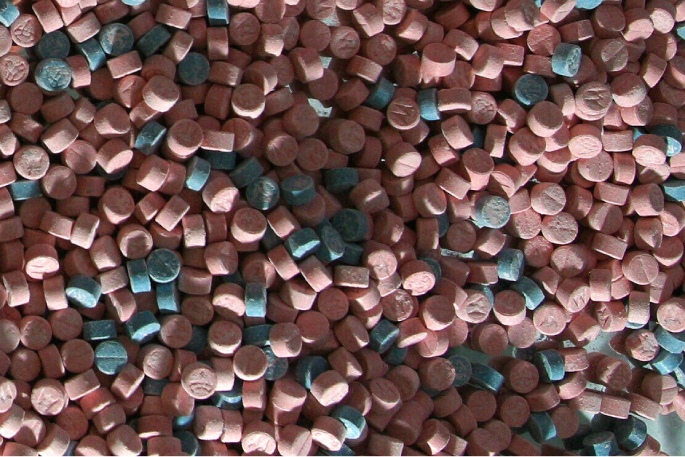International crime groups see New Zealand as a golden nugget for their drug trade, say police.
Customs and police figures released to RNZ show a spike in some drugs seized in the first half of this year.
Most illicit drugs come from overseas manufacturers and international syndicates, known to police as Trans-national Crime Groups.
National Organised Crime Group director Detective Superintendent Greg Williams said there were many ways drugs were smuggled into the country.
"So that's through the airports and their cargo, on ships, on small ships coming in, in parcel post, being brought in by an individual courier into the country, or examples like rip-on/rip-off in containers, or hidden under ships," he said.
Methamphetamine - in both liquid and powdered form - was the highest-value drug seized.
From January to July this year, seized powdered meth alone had a street value of nearly $370m.
Williams said New Zealand was a golden nugget for transnational crime groups, paying some of the highest prices in the world.
"We've had our gangs and organised crime groups in this country operate like a cartel, where they've kept the prices virtually unchanged for the last sort of 15 years," said Williams.
For comparison, Williams said a point of methamphetamine in the United States cost about $5, while in New Zealand, the same quantity would cost roughly $80-$100, depending on where it was purchased.
"And the wholesale rates have tumbled to virtually zero, so in Myanmar now a kilo of methamphetamine's $1000.
"That means, you land that product into our country and you can make huge money off it," he said.
"The trans-national crime groups across the world see us as a golden nugget, they see the opportunity to make big money here that they wouldn't make in other countries."
Williams said police worked with offshore agencies to disrupt criminal operations.
"What we're learning to do with our agencies is basically understand how [a transnational crime group] operates and functions and we're we can disrupt it, where we can gather evidence from the way in which they operate, and how we actually conduct our investigations that are multi-level, so here in New Zealand and across the world, to actually impact those entire supply lines."
Police and customs data from January to July of year provided to RNZ showed authorities have already seized more GHB - known as the date rape drug - than they did during all of of 2023.
Almost 775,000ml of GHB was seized up to July, compared with almost 525,000ml in the whole of last year.
And seizures of the drug MDMA, or ecstasy, were set to outstrip what was seized last year.
More than 1.5 million tablet equivalents of MDMA were seized in the first half of the year, compared with almost two million throughout 2023.
Drug Foundation executive director Sarah Helm said the drug trade was responding to the challenge of police and customs' seizures.
"The international market expects a degree of loss, and so they've become increasingly good at producing huge volumes with that in mind," she said.
"What we see instead is that those substances end up being replaced, often with the same substance but not always, and so, for the person who might be using the substances, the risk potentially increases with the seizures."
She said more of a focus needed to be on effective prevention measures.
"A really good strategy would involve not just supply, control, and a bit of policing, it would also involve demand reduction and harm reduction.
"The demand reduction and harm reduction doesn't get as much attention or resource put it," said Helm.
"We're not putting enough resource into known effective measures."
Helm said methamphetamine was being consumed in New Zealand at the same rate in the population as it had been for about a decade - just over one per cent - and cocaine was more available in the community than it had been previously.
She said new illicit substances were always appearing and users would take them not knowing the effect - whether it was a bad hangover the next day, or if it were lethal.
-RNZ



2 comments
Worth The Effort
Posted on 11-09-2024 07:56 | By Yadick
Keep learning their ways and keep busting their butts. Our Police and other agencies are starting to do great work in slamming these absolute self centred mongrals.
The problem is the courts and their PC'ness. Cultural reports etc are nothing more than pathetic excuses that the Judges fall for. These criminals know their behavior is illegal and that's why they go to great efforts to hide it and it's past time our courts recognised that.
Well here's news to these low life, our Police efforts are becoming greater than yours and they're coming for you.
Cut the demand
Posted on 12-09-2024 14:12 | By morepork
When I started reading this article the first thought I had was: "Why aren't we attacking demand and working with people who are at risk?"
Then this:
"A really good strategy would involve not just supply, control, and a bit of policing, it would also involve demand reduction and harm reduction.
"The demand reduction and harm reduction doesn't get as much attention or resource put it," said Helm.
"We're not putting enough resource into known effective measures."
It's not rocket science to realize that, if no-one was taking drugs, we wouldn't have a problem. At some point along the way, the drug pushers persuade someone that it is cool and they should try it. We need to have credible counter actions from credible sources. We should be getting rehabilitated users on side and making it socially unacceptable, and we should be warning potential users about life-destroying effects.
Leave a Comment
You must be logged in to make a comment.